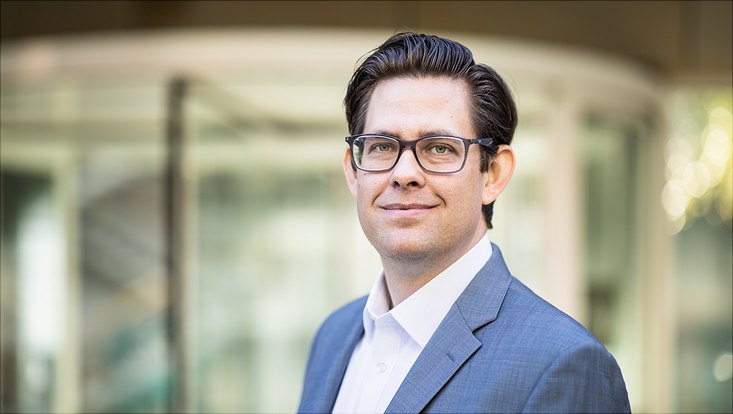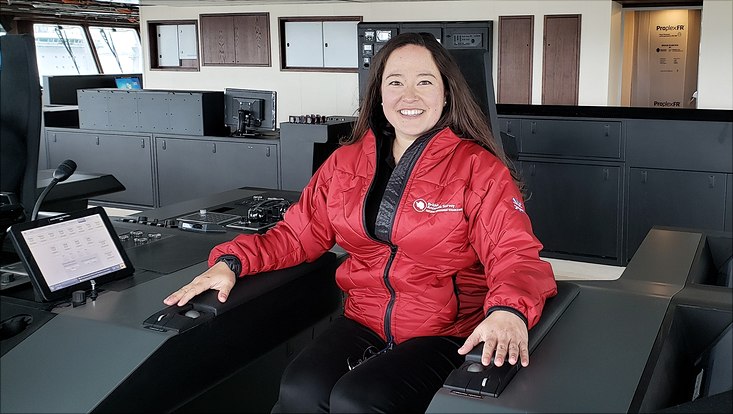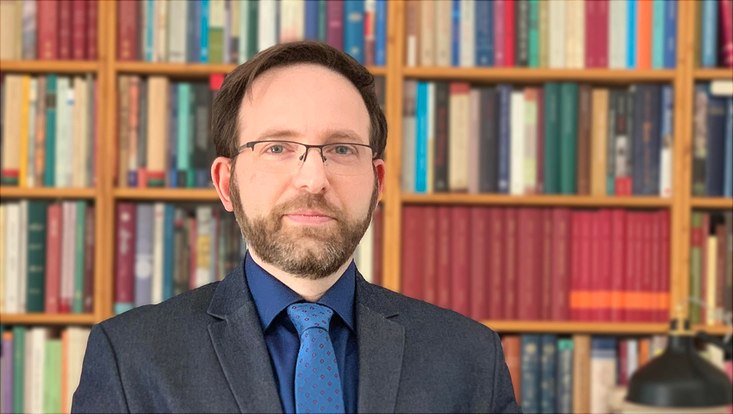„Welcome Aboard““We need a new generation of young people who can think critically, innovatively, and with self-reflection”Prof. Dr. Aaron Butts strengthens the Faculty of Humanities
12 October 2022, by Butts/Red.

Photo: UHH/Esfandiari
Every year, Universität Hamburg welcomes many new researchers. Here, we present part of a series to introduce them and their areas of research. This time, we are introducing Prof. Dr. Aaron Butts.
Prof. Dr. Aaron Butts came from the Catholic University of America (Washington, D.C.) and has been working in the Faculty of Humanities since 1 September 2022 as professor for Semitic Studies, especially Ethiopian Studies. In 2022 he was awarded an ERC Consolidator Grant by the European Research Council and will receive almost 2 Million Euro for his research. At Universität Hamburg he will closely collaborate with the Cluster of Excellence “Understanding Written Artefacts”.
My research area in 3 sentences:
My research is concerned mainly with the Semitic languages of Late Antiquity and the Middle Ages, especially Ethiopic and Syriac. In addition to these languages, I am also interested in the texts that transmit these languages as well as the communities that wrote and copied these texts. In addition, I examine the historical context of Near Eastern Christian communities, including their interactions with each other and with Jews and Muslims.
I explain what I do to my family as. . .
I devote most of my time and energy to working with texts, manuscripts, and inscriptions written in ancient Semitic languages. You will probably be familiar with modern Semitic languages such as Arabic or Hebrew, and maybe even Amharic spoken in modern-day Ethiopia, but I work primarily with ancient Semitic languages.
Among the ancient Semitic languages, I specialize in two in particular. One is called Ethiopic: Ethiopic is the ancient language used in the region that is now Eritrea and northern Ethiopia. Ethiopic is first attested in inscriptions from the first centuries of the Common Era, and it eventually developed into the literary and religious language of Ethiopian and Eritrean Christianity. The other ancient Semitic language in which I specialize is Aramaic. Aramaic is perhaps best known as the language that Jesus and other first-century Jews spoke, but Aramaic’s history predates Jesus by a thousand years and continues until the present, in each period thriving in many different dialects. I concentrate on one particular dialect of Aramaic that is called Syriac.
Both Ethiopic and Syriac are classical literary languages of Christian communities. I work on the manuscripts and inscriptions of these communities with particular interest in studying their histories from the early centuries CE up through the medieval period.
I am so glad to be in Hamburg, the city and the University, because. . .
My move to the city of Hamburg and to Universität Hamburg presents me with many new opportunities, both personally and professionally.
Personally, I am very happy that I am living in Europe, and in Germany in particular. I have quickly fallen in love with the city of Hamburg, which I find to be a lively international city with so much to offer to its residents, a quiet walk along the Alster, a spectacular performance at the Elbphilharmonie, an afternoon at Planten un Blomen, fabulous museums and seemingly endless cafes and restaurants ... I feel fortunate to be living in Hamburg.
Professionally, Universität Hamburg is among the best universities in Germany, and it is an especially good fit for my own profile. The Hiob Ludolf Centre for Ethiopian and Eritrean Studies (HLCEES) at UHH is a global leader in the field of Ethiopian Studies, and I greatly look forward to contributing to its stellar program of teaching and research. In addition, Universität Hamburg is well known for its Cluster of Excellence “Understanding Written Artefacts”. This Cluster of Excellence is one of the main attractions that drew me to UHH, and I welcome the opportunity to collaborate with colleagues in the cluster who are working on so many rich and diverse topics, from palimpsests to inscriptions, from graffiti to manuscripts.
My plans for working at Universität Hamburg include. . .
At Universität Hamburg, I plan to undertake my project “BeInf – Beyond Influence: The Connected Histories of Ethiopic and Syriac Christianity”, which is funded by an ERC Consolidator Grant. BeInf takes as its impetus a long-standing question in scholarship about so-called Syriac “influences” on Ethiopic Christianity, but to answer this question my project jettisons the conceptual frameworks of previous scholarship and instead aims to develop new ways of thinking about the connections, contacts, exchanges between Ethiopic and Syriac Christianity.
In addition, BeInf adopts a multi-disciplinary approach that brings together methods traditionally disconnected, including art history, linguistics, manuscript studies, philology, textual studies, and history. In this way, my BeInf project is positioned to make significant, long-lasting contributions to the field Ethiopian Studies, both in content and in concept, while also serving as a paradigm-shifting model for other projects in the humanities addressing “connected histories” with all their nuance, complexity, and texture through a multi-disciplinary approach.
More broadly, I plan to deepen UHH’s strengths in Ethiopian Studies, especially in Ethiopic language, literature, and manuscripts, within the context of the Hiob Ludolf Centre for Ethiopian and Eritrean Studies as well as the department for African Languages and Ethiopian Studies. In addition, I aim to establish new strengths in Semitic Studies and the Study of the Christian Near East. I am particularly interested in developing Syriac studies and Christian Arabic studies, thereby giving a broader base for the Semitic languages of Late Antiquity and the various traditions of the Christian Near East. My work in developing these new fields at UHH will present opportunities for collaboration with colleagues in Jewish studies and Islamic studies.
Students should definitely attend my courses because. . .
I often begin each of my courses by stressing that my primary goal is to teach students how to read texts, as well as art and architecture, closely and carefully and with methodological, if not theoretical, sophistication. If you want to learn about different parts of the world, from the Middle East to the Horn of Africa, then my courses will be of interest to you, but even if you are not interested in these particular regions (or at least not yet!), still know that my courses aim to teach one of the most important skills in life: how to think critically, innovatively, and with self-reflection.
In my courses, students will be encouraged – even required! – to develop their own thoughts and perspectives as well as to express these in their own unique voices. Academia – and society more broadly – is in desperate need of new ideas, and through my teaching I aim to prepare students to participate in these conversations.
Reaching out to the world: I work with the following international and federal institutions and universities. . .
I will continue to collaborate with my many close colleagues in North America. These are relationships that I am very much looking forward to leveraging in new ways now that I am based at Hamburg. In addition, I am excited about possibilities for new collaborations with colleagues in Europe that will be facilitated by closer geographic proximity: Up to this point in my career, I have established many connections with colleagues across Europe, but my collaboration with European colleagues has been strained by the reality of the physical distance that has previously separated us. Based now in Germany, the landscape looks very different, and I see exciting new opportunities in every direction. Finally, I look forward to strengthening networks and connections with scholars in the Middle East and in Africa. It is crucial that these scholars – and the communities whom they represent – are not only part of the conversation in my field, but that they stand at the center of it.
My ERC-funded BeInf project will bring two post-doctoral researchers and two senior research fellows from outside of Germany to Universität Hamburg over the next five years. BeInf will also host several large international conferences, which will bring dozens of scholars from Germany, from Europe, and from further abroad, including especially North America and Ethiopia. In addition to BeInf, I hope to inaugurate a “Semitic Studies Research Colloquium” that will hold regular lectures/seminars throughout the academic year. These will take place in a hybrid format to foster a community at Universität Hamburg in this new research area while also broadcasting our new directions to the broader academic community. The speakers for the “Semitic Studies Research Colloquium” will be external scholars active in the field who come to UHH to share their expertise and enthusiasm.
My research is important to society:
Because it encourages the development of new ways of thinking about old problems. One must only read the front page of the newspaper to know that society is faced with countless problems, for instance, the COVID pandemic, or wars, or climate change, all of which are exacerbated by our abject failure to end poverty and fight inequality. We are a society faced with existential threats.
My research does not produce new vaccines or develop new sources of renewable energy. It does not even teach diplomacy or geo-politics. We undoubtedly need more research and teaching in these areas as well as many others. I am, however, interested in a more fundamental idea: We need a new generation of young people who can think critically, innovatively, and with self-reflection, and my research and teaching in their most basic element aim to develop this skill.
More concretely, my research confronts questions of diversity of perspectives, competition and coexistence between groups, religious difference and tension, as well as more broadly how to study and understand historical development and change. I am particularly interested in the connections, contacts, circulation, integration, and exchange that characterize the human endeavour both past and present.


